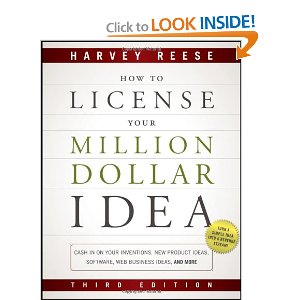 Title: How to License Your Million Dollar Idea: Cash In On Your Inventions, New Product Ideas, Software, Web Business Ideas, And More
Title: How to License Your Million Dollar Idea: Cash In On Your Inventions, New Product Ideas, Software, Web Business Ideas, And More
Author: Harvey Reese
Cost: $15.72 At Amazon
Book Review
This is the now third edition of what has become regarded as a venerable basic bible for many inventors, whether rightly or wrongly. The focus of How to License Your Million Dollar Idea is extremely broad and incorporates, in its title and its contents, both “inventions” in the traditional sense, whether consisting of tangible products or software such as smartphone apps, and the far more amorphous and intangible licensable ideas like new methods of doing business on the web.
That said, the author may have weakened the focus of a generally valuable book by trying to do too much in one book. The sections discussing the licensing of software, for instance, have a bit of a flavor of being simply slapped together and added at the last minute without any real depth. The topic is clearly worthy of more detailed treatment, and the reality is that the intellectual property issues involved there, by themselv es, are relatively complex, and almost necessitate a fuller treatment addressing some of the ways in which patent, copyright, trademark, and trade secret principles can overlap and interact.
There is increasingly, it seems to me, a real need for a book that focuses in on the sole topic of generating, protecting, and licensing new methods of doing business on the Internet. While the once rising star that was Groupon, for instance, may have become somewhat eclipsed recently, the story of how that concept was developed and how it so quickly became popularized has a host of lessons for the creative inventor lurking in it. Groupon was hardly the first such phenomenon, and the next Groupon, or Facebook, or… is undoubtedly out there, today not more than a glimmer in a person’s eye. This book hints at that amazing prospect, but does not really attempt to fully explore it.
How to License Your Million Dollar Idea has also been criticized by some for engaging in a bit too much promotion and marketing of the author’s own invention marketing services, but I think that any mature and worldly wise reader will be able to spot such statements and take them with a grain of salt.
The strength of the book is its description of the licensing process, drawn from the author’s own experiences and knowledge of the contemporary marketplace. It is less helpful when it comes to methods of generating ideas, although he does spend some time on it, and gives some concrete historical examples, but without a truly fleshed out analysis of the brainstorming process that led to the spark of invention. This may be less troubling for those of us who already have a head clogged full of innovations, who really need specific knowledge as to how to convert all that creativity into a marketable commodity.
How to License Your Million Dollar Idea is also relatively weak on concretely presenting steps to take to protect a licensable idea or concept. In summation, while there is much of value here, this may not necessarily be the best book to begin with if you are new to the subject area.

Leave a Reply